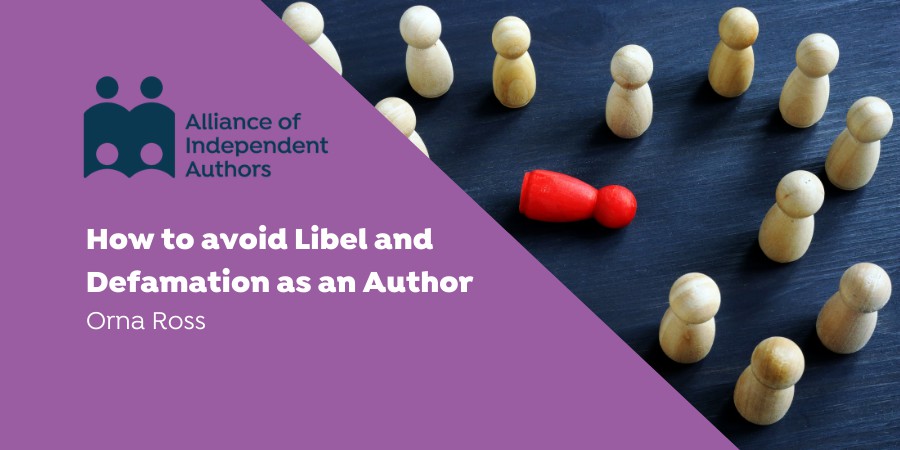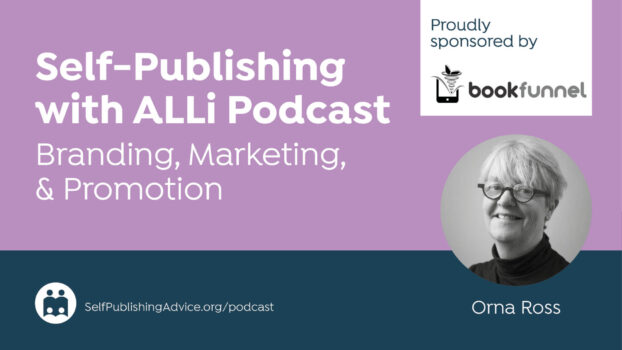Most authors don't need to worry about libel. It’s rare for a novelist to be sued, but some kinds of books are particularly tricky, especially memoir and other kinds of non-fiction. This post examines how to avoid libel as an author.

Orna Ross, Director of ALLi
As writers, we speak truth to power and publishing defamatory material is sometimes necessary. There are many sad stories of bad people in this world that need to be told. This can put us at risk, as writers and as publishers.
Libel law (quite rightly) protects individuals and organisations from mistaken, untruthful or unwarranted attacks on their reputation. By law, you can only publish defamatory material if it comes within one of the recognised legal defences.
If it doesn’t, its publication is deemed to be libel (see below) and you could be subject to an expensive lawsuit. If you cannot substantiate what you have written, your credibility and that of your website, books, and mission will be undermined.
When a writer needs to tackle injustice, corruption and other behaviors, it helps to understand libel law and the most common defences used in defamation cases.
While most authors will never be sued, the onus is on you to ensure that you respect and protect other reputations, just as you would want your own to be protected.
People will unthinkingly tell you to “take legal advice” but such advice will run into thousands, if you’re going to a properly qualified lawyer. It's a specialist subject. There is no legal aid for libel cases and no insurance that will protect you from making unsubstantiated claims.
All in all, it's much better to avoid defamation and libel in the first place and to stay on the right side of privacy law.
We are not lawyers and what follows is general guidance.
Disclaimers
The lines quoted at the end of movies–about the story, names, characters, and incidents being fictitious and no identification with actual persons (living or deceased), places, buildings, and products being intended or inferred–applies to novels too. It doesn't offer a lot of protection, if a person brings a good libel case.
If you change names and other details to protect people's reputation and privacy, it might be enough to protect you from a lawsuit. But equally, they might still sue and there's no guarantee of you winning a lawsuit if it goes to court, just because you've used that disclaimer.
Libel and Defamation: Some Definitions
People often use interchangeably the terms libel and defamation and they are effectively the same thing, referring to published material that damages the reputation of an individual or organisation. Libel is defamation by the written word, slander is defamation by word of mouth.
You are also liable if you publish a defamatory or libellous statement made by someone else (on your blog, for example, or in your book) even if you quote them accurately.
A person or organization is libelled if a publication:
- Discredits them in their trade, business or profession
- Exposes them to hatred, ridicule or contempt
- Causes them to be shunned or avoided
- Lowers them in the eyes of society
The test of libel used by the courts is what a “reasonable reader” is likely to take as their natural and ordinary meaning, in their full context – what you intended, as author or publisher, is irrelevant.
Note also that in many jurisdictions, the burden of proof in a libel case lies with the author or publisher. The person you’ve allegedly libelled does not have to prove that you’re wrong in what you say. It is you who will have to prove that what you wrote was true at time of writing.
How to avoid Libel and Defamation as an Author: General Guidelines
Do everything you can to avoid libel. Make the obvious checks. Don’t rely on biased sources. Be measured, not emotional.
When writing non-fiction, stick to the facts. Resist speculation and especially any temptation to say more than you know. Consider putting your criticisms to those you are criticising before you publish. Give them a right to reply.
Proceed mindfully and cautiously. Change names and any other details that don't interfere with your story. If it doesn't need to be there, get rid of it. Make your characters substantially different from any real world subjects.
Be aware of privacy law as well as libel. Human rights law gives all citizens the right to privacy. Harry Bingham of Jericho Writers recalls an example of a book that was publishable, except for privacy issues.
The case I particularly remember was a really excellent and shocking memoir by a British-Asian woman who had been forced into an arranged marriage and had been very badly treated by both husband and mother-in-law.
The husband had in fact been charged with assault by a court, and convicted, so libel issues weren’t in play. The substance of the book’s allegations had been tested in court and upheld. The text was certainly defamatory, but it was most demonstrably true.
So the thing that broke the book – we got an agent for the author, but not a publisher – was the mother-in-law’s right to privacy. This awful woman, who had been highly complicit in her son’s abusive behaviour, nevertheless had a right to privacy that the courts might have been willing to uphold. So all the publishers contacted by the agent refused the book.
In my view, that was cowardly, but it’s an issue to think about before you embark on your project.
Some people are much more likely to sue for libel than others: politicians, police, journalists, lawyers, big business, celebrities, those whose reputation is important to their livelihood and have the resources to take action. Organizations tend to take libel cases more than individuals.
How to avoid Libel and Defamation as an Author: Ten Considerations
1. Word Choice
The first battle in a defamation case is usually over what the words mean. You need to examine your work for slights that are likely to sting or hurt. What will the average, reasonable, fair-minded reader assume on reading your material? Be accurate and precise and fair. Don't exaggerate. Watch out for innuendo.
2. Inferred Meaning
In libel and defamation cases, you are responsible (and legally liable) not just for what you say, but what the common reader is likely to read between the lines. Watch for tone and attitude, as well as language choice.
3. Be clear
Plaintiffs will exploit ambiguity, and argue that the average, reasonable, fair-minded reader would assume the worst. Eliminate ambiguity and convey your meaning precisely.
4. Only say what you can prove
What evidence could you put before a court if someone challenged you? How convincing would that evidence be? If you’re citing documents, who else can authenticate them? Do you have sources? How credible are they? Do they have first-hand knowledge? Are they willing to give evidence?
If you’re accusing someone of a crime, you need to have particularly strong evidence. It is difficult to prove someone’s state of mind, so you are better off talking about the person’s conduct itself (what she said was false/misleading) rather than stating baldly that she lied.
5. Say also what you don’t know / cannot prove
If you are transparent about what you are not alleging, you make it hard for a plaintiff to argue that readers will assume the worst.
6. Pick the right “tier” of allegation
Courts distinguish between “tiers” of allegation, depending on how equivocally the accusation is put.
- Allegation of guilt – Mr X is corrupt.
- Reasonable grounds to assume guilt – Is Mr X corrupt?
- Reasonable grounds for inquiry – Need to investigate whether Mr X is corrupt.
It’s much easier to prove a tier 3 allegation than a tier 1 allegation. Evidence pointing to guilt is sufficient to support such an allegation, rather than needing to prove it.
7. Defence of truth
The main defence to a libel action is ‘truth', that is being able to prove that the defamatory allegation is substantially true. But be aware that no defence of libel, even truth, is failsafe. Your sense of something being “the truth, the whole truth, and nothing but the truth” can become less absolute during legal proceedings.
8. Defence of opinion
There’s a defence called honest opinion / fair comment for those who are expressing clear opinion on accurate facts. Separate them out and distinguish between the two in your language. Use words like “seems”, “appears”, “perhaps”, “maybe”, may have” when giving your opinion. If the facts are in the public domains, cite sources. Contrary to popular belief, just adding ‘allegedly’ is not enough to clear you of libel contraints.
9. Defence of Absolute or Qualified Privilege
Certain situations are subject to privilege and insulation against defamation e.g. council meetings, press conferences, public inquiries, parliaments, etc. Reporting on what is said there in a fair and accurate manner and in good faith protects against libel and defamation suits
10. Act ethically
This is your best protection. If you act ethically, you’re less likely to defame or libel. If you inadvertently do, you are less likely to be sued. And if you are sued, your defence will be more robust and a judge or jury is likely to be more sympathetic.
In a worst-case scenario of having to go to court, acting ethically may allow you to argue for a defence of qualified privilege. Although this defence is in flux, it may be available to publications on matters of public interest where the publisher has acted responsibly.
Position yourself to take advantage of this possibility.
How to avoid Libel and Defamation as an Author: Retraction
There other main defence is retraction of the allegedly defamatory statement. Issue a correction and apology if you get something wrong.
In summary, always check your sources, act ethically, avoid using anything you're not 100% certain is true, where possible, use “fair comment” wording, and if in doubt, leave it out.
Be as careful and caring of the reputation of others as you would want others to be of yours.





Thanks for this information! I would like to share that I am in the process of publishing or sharing my story about how I overcame depression. In discussing the causes of my torment, I have to mention ppl who affected me in the past. I changed all the identifying details, don’t mention real places, names, dates, etc. However, I include pics of myself. My question would be, could the real pictures of myself be a problem or an identifying detail? People who know me would know what teacher I am referring to, even though I don’t say names of places and changed dates. Am I being paranoid? But also, even though I’m even using a fictissious last name, family members would feel like exposed if someone knows my family. It’s not that I live with them, but… So, in order to avoid all this, that may not happen at all, I went ahead and edited my pics, so no one will see my real face! Problem solved! right? However, for how long could I hide myself? I would keep contact with readers by voice only, radio, emails, etc. But is this a good solution? Or should I share my real images, after all I am the author, under my right of free speech? I would love to know your opinions. Thanks!
FYI- You have a lot of mispellings
What if my disclaimer states that my novel is contemporary satirical work of fiction and parody (plus the standard type disclaimer) except for certain obvious characters “that have been intentionally morphed, imbued, or endowed with the legendary features, characteristics, and attributes of well renowned literary characters” from a legendary fable/tale (the book will be identified in the disclaimer – for instance Arthur and Guinnevere) of more than 1500 years old, of whom this piece is based upon and lovingly dedicated to.
Thank you for the helpful article. My question regards poetry. I write poems, as I move through depression. They tend to be raw and dark… For example, recently, I write one titled : My Father. It mentioned themes such as incest and murder ( and assigned these to particular characters. I like to share my poems with friends, sometimes even via facebook… I am Not a recognized publishing author ( I’ve never tried to become one), but only tend to write for myself and a small circle of friends. But I couldn’t not write. It’s something I’ve always done , and sometimes it is my lifeline. There is remarkably little advice online on privacy and defamation issues in the context of poetry, which… as I learn and bizarrely enough a lot of people consider Fact, not Fiction… I have recently started to put disclaimers under the more brutal/personal poems ( stating all persons and events mentioned are a product of creative license/ author’s imagination, although I’d rather not have to do that. And, in any case, I’m not sure if this is enough… Perhaps you could advise me. Thank you very much.
Right now I’m panicking about this very topic. I’ve just received an angry and brutal email from a reader of one of my novels who found my main character’s reaction to another character’s appearance offensive and demeaning and cruel (and no, this appearance issue has nothing to do with skin color, merely a physical feature). The reaction was more to show the main character’s flaws, rather than to make fun of anyone with a certain physical trait.
I’m now worried that this person (or another like-minded person) might sue me for what they perceive as offensive content by making a claim of emotional pain (or something equivalent). I realize this goes far beyond the scope of libel and defamation, but I’m finding myself unable to sleep or write for fear that a character’s reaction to some innocuous physical trait might be offensive to someone.
I normally have tough skin about negative comments, but this goes beyond anything I’ve experienced.
I should note that the book is entirely fictional (humorous urban fantasy), and that none of the characters are based on anyone in real life.
Ignore the douche. There’s always going to be haters hating on others’ works. If he doesn’t like it then you can tell him to go read another book or write one himself. Unless you used someone’s real name (eg. a celebrity), he can’t do much about it cuz it’s a work of FICTION.
This is a really helpful article but despite it being the most helpful I could find, I just can’t find anything about where I stand with writing my memoir that spends some time looking at the evidence on the impact of childhood trauma in adults. The story includes my experience of childhood trauma. What I can’t work out is can I write about it? I intend to contact people who witnessed it. Can I be sued for invasion of privacy or defamation by my parents?
Nobody can give you a straight yes or no answer to this Sarah — so much depends on what you write, how you write it etc. And also what country you are in. Some territory’s libel laws are much stricter than others. The point is to write the book without defamation i.e. to be fair and considered and yes, witnesses certainly help if it should come to a court case.
Thank you for sharing this information for authors. It’s a great high level overview with a handy checklist to keep in mind.
Great useful article on How to avoid Libel and Defamation as an Author – it’s easy to fall foul especially when expressing pain and emotion. As a Publisher as well as an author, I see it as my responsibility, or duty of care – to check the content and keep my authors “in the clear”. I have advised other authors who have had that awful dreaded Cease and Desist letter from a solicitor! This is a letter that requests that an individual or organization stop a specified action and refrain from doing it in the future, with a threat of legal action if the recipient fails to comply. This can include ‘pulling’ an author’s book.
In some cases the ‘publisher’ washes their hands and claims no responsibility – which baffles me, as surely if they had read their author’s book, they could have prevented this in the first place! Or is this just me? So, take care out there and carefully choose your publishers too!
Great advice!
Who would you recommend as a good publisher that would look for the correct wording?